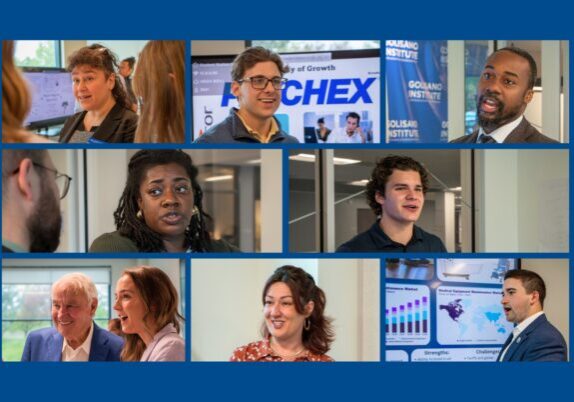There are Alternatives to the Four-year Degree and Staggering Debt that Comes With it
February 20, 2024

Published 2/15/24 Rochester Business Journal
By Caurie Putnam, Rochester-area freelance writer
Three years ago, Richard DeMartino, Ph.D., a professor in the department of management at the Saunders College of Business at the Rochester Institute of Technology (RIT), began thinking hard about traditional four-year degree programs and the number of people struggling to finish or finishing with debilitating debt.
“The concept of one size fits all in education has been detrimental,” said DeMartino, about traditional approaches to higher education in the U.S. “The price of a four-year degree has gone up 300 percent since the 1980s in real dollar terms. The critique is not that we have to kill higher ed or that we have to kill the four-year degree, but that there are options.”
DeMartino, who also started and leads the Simone Center for Innovation and Entrepreneurship at RIT, belongs to a small group of fellow scholars from his institution and the University of Rochester that discuss and research alternative credentials — options for students to become educated in their career area of interest in ways outside of a bachelor’s degree.
“When we talk about alternative credentials, they’re generally certificates or boot camps,” DeMartino said. “But they could really be almost anything and many of them are offered by traditional universities, but they don’t have to be.”
At RIT, for example, there is RIT Certified, which provides a wide range of workforce development and professional training courses, certificates, skill-based programs and digital badges.
A new alternative option to a four-year degree in Rochester is the Golisano Business Institute — a not-for-profit two-year certificate program comprised exclusively of business-related subject matter aimed at reducing the time and cost of a traditional business school education.
Ian Mortimer, D.B.A, is the president of the Golisano Business Institute. He was most recently vice president for enrollment management and associate provost at RIT and belongs to the alternative credentialing group with DeMartino.
“There’s all kinds of research that demonstrates that students go to college for one or two reasons,” Mortimer explains. “They go to build social capital, or they go to build economic capital. We believe that for those students who are more interested or more aligned with the economic capital part of education, then an alternative that is more focused on those outcomes just makes sense from a time perspective and from a money perspective.”
Paychex founder Tom Golisano fully funded and endowed the establishment of the institute, where tuition for the two-year certificate program is $8,900 per year (which includes technology and books). There is a financial support program available.
“It would be impossible for us to do what we’re doing without Tom’s philanthropy and without him wanting to use the institute as a vehicle to further spark economic development,” Mortimer said. “He really believes that all people can achieve incredible outcomes if given the opportunity and the networking, coaching and support.”
The first cohort of fifty students is just finishing the second quarter of their eight-quarter program and beginning the six-week micro internship portion at sites that align with their career interests, like Paychex, Iron Bay Capital, Village Bakery, and Fox Run Vineyards. They complete a longer internship in quarter seven.
“One of the distinctive differences of our program is that we take quarter eight and make it open-ended to assure that every student has a next step after graduation,” Mortimer said. “Most colleges and universities do not do a great job in terms of handing off the graduate into the workforce. Therefore, we have carved out eleven weeks to ensure that every student has that next step.”
Mortimer, whose doctoral dissertation was on the topic of exploring alternatives to traditional college in a post-pandemic environment, encourages anyone going through post-secondary decision-making for themselves or with their children to discuss the topics of time, investment, and what they hope to achieve.
“Don’t assume that an individual’s growth trajectory has to be linear,” Mortimer said. “It can have a beginning and multiple beginnings and multiple ends rather than a long-term beginning with the hope of a long-term finish.”
At Monroe Community College (MCC), many alternatives to a traditional four-year degree are available, including two-year associate degrees, apprenticeships, and certificate options through the School of Applied Sciences and Technologies in areas including culinary arts, hospitality, optical systems technology and precision machining.
“Not every student fits a degree pathway,” said Dino Laury, Ed.D, MCC’s dean of career technical education on the importance of alternatives to four-year degrees. “Many are visual learners. Then there are students that don’t want to wait four or five years to get that living wage. They want to kind of hurry up, get some training, and get into the workforce.”
Acknowledging that each student is on their journey and helping them find the right fit is a central part of the ethos of MCC, according to Michael Jacobs, D.A., MCC’s dean of humanities and social sciences.
“If we’re doing our jobs we’re engaging students from the very earliest parts of onboarding to identify and help them develop their goals academically, professionally, personally and beyond,” Jacobs said. “And then getting them on the right pathway, whether that means a four-year degree, graduate school, two-year degree, certification, or something like a micro-credential.”
Micro-credentials, by SUNY’s definition, are valued learning experiences with learning outcomes that verify, validate, and attest that specific skills and/or competencies have been achieved by a student.
“SUNY is invested heavily in the establishment of micro-credentials across its sixty-four campuses,” Jacobs said. “The idea behind them is that they are stackable, meaning that you can earn multiple ones and they could be stacked onto your degree program.”
At a two-year institution like MCC they function like a minor for a four-year degree, with the idea behind them is with the completion of a micro-credential, you will have developed a marketable and desirable skill set, Jacobs said.
Share this article
Related Articles
“The opportunity is out there. You just have to find it.”
Tom Golisano, Founder

